-
 Bitcoin
Bitcoin $76,333.1139
-3.03% -
 Ethereum
Ethereum $1,457.5872
-6.44% -
 Tether USDt
Tether USDt $0.9991
-0.04% -
 XRP
XRP $1.8180
-4.86% -
 BNB
BNB $551.9557
-0.38% -
 USDC
USDC $0.9999
-0.01% -
 Solana
Solana $104.2978
-2.16% -
 TRON
TRON $0.2307
1.17% -
 Dogecoin
Dogecoin $0.1431
-3.28% -
 Cardano
Cardano $0.5648
-2.82% -
 UNUS SED LEO
UNUS SED LEO $8.9981
0.65% -
 Toncoin
Toncoin $2.9726
-1.74% -
 Chainlink
Chainlink $10.9354
-4.23% -
 Stellar
Stellar $0.2220
-4.66% -
 Avalanche
Avalanche $16.1252
-4.57% -
 Sui
Sui $1.9788
-1.91% -
 Shiba Inu
Shiba Inu $0.0...01067
-5.86% -
 Hedera
Hedera $0.1483
-0.90% -
 MANTRA
MANTRA $6.1649
-1.57% -
 Bitcoin Cash
Bitcoin Cash $270.9224
-2.74% -
 Polkadot
Polkadot $3.4254
-4.57% -
 Dai
Dai $1.0000
0.00% -
 Litecoin
Litecoin $68.6888
-3.33% -
 Ethena USDe
Ethena USDe $0.9985
-0.02% -
 Bitget Token
Bitget Token $4.0154
-1.57% -
 Pi
Pi $0.5625
-3.65% -
 Hyperliquid
Hyperliquid $11.0117
-4.56% -
 Monero
Monero $197.7621
-1.36% -
 Uniswap
Uniswap $4.8932
-4.07% -
 OKB
OKB $50.1114
-2.03%
What is a decentralized domain name service? How does it achieve Web3 identity management?
Decentralized DNS uses blockchain to manage domain names, enhancing security and enabling user-controlled Web3 identity management.
Apr 06, 2025 at 11:01 pm
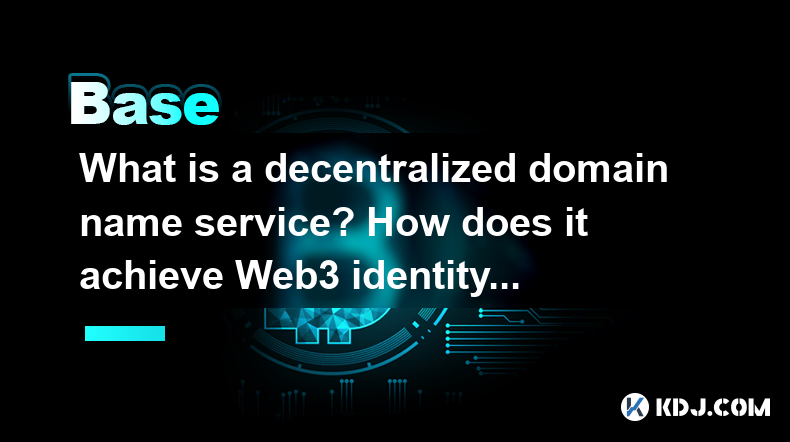
A decentralized domain name service (DNS) represents a pivotal shift from traditional centralized systems to a more secure, user-controlled, and transparent framework within the cryptocurrency and blockchain ecosystem. Decentralized DNS leverages blockchain technology to manage domain names, ensuring that control over these digital assets remains in the hands of the users rather than centralized authorities. This system not only enhances security but also plays a crucial role in achieving Web3 identity management, which is essential for the decentralized internet.
Understanding Decentralized DNS
Traditional DNS systems rely on centralized servers to translate human-readable domain names into IP addresses. In contrast, decentralized DNS uses blockchain technology to store domain name records. This means that instead of a single entity controlling the DNS, the responsibility is distributed across a network of nodes. Each domain name and its associated data are recorded on the blockchain, making it immutable and resistant to censorship or manipulation.
Key Features of Decentralized DNS
- Immutable Records: Once a domain name is registered on the blockchain, its record cannot be altered without the owner's consent. This feature ensures that domain names are secure and cannot be hijacked or taken down by third parties.
- User Control: Users have full control over their domain names. They can manage, transfer, or sell their domains without needing to go through a centralized registrar.
- Transparency: All transactions and changes related to domain names are recorded on the blockchain, making the process transparent and verifiable by anyone.
How Decentralized DNS Achieves Web3 Identity Management
Web3, the next generation of the internet, emphasizes decentralization, privacy, and user sovereignty. Decentralized DNS is a cornerstone of Web3 identity management because it allows users to own and control their digital identities. Here’s how it works:
- Self-Sovereign Identity: With decentralized DNS, users can create and manage their own digital identities without relying on centralized services. This self-sovereign identity model is crucial for Web3, as it empowers users to control their personal data and online presence.
- Interoperability: Decentralized DNS enables seamless interaction between different blockchain networks and decentralized applications (dApps). Users can use their domain names across various platforms, enhancing the interoperability of Web3 ecosystems.
- Privacy and Security: By using blockchain technology, decentralized DNS ensures that user data is encrypted and secure. This reduces the risk of data breaches and unauthorized access, which is a significant concern in traditional centralized systems.
Implementing Decentralized DNS
To implement decentralized DNS, users need to follow a series of steps that involve interacting with blockchain networks and decentralized platforms. Here’s a detailed guide on how to register a decentralized domain name:
- Choose a Decentralized DNS Platform: There are several platforms that offer decentralized DNS services, such as Ethereum Name Service (ENS) and Unstoppable Domains. Choose a platform that aligns with your needs.
- Set Up a Wallet: You’ll need a cryptocurrency wallet that supports the blockchain network of your chosen platform. For example, if you’re using ENS, you’ll need an Ethereum-compatible wallet like MetaMask.
- Fund Your Wallet: Ensure your wallet has enough cryptocurrency to cover the registration fees. For ENS, you’ll need ETH; for Unstoppable Domains, you might need other cryptocurrencies like ZIL or BTC.
- Register Your Domain: Navigate to the platform’s website and follow the instructions to search for and register your desired domain name. This typically involves entering the domain name, confirming the registration, and paying the fee.
- Manage Your Domain: Once registered, you can manage your domain through the platform’s interface. This includes setting up records, transferring ownership, or renewing the domain.
Benefits of Decentralized DNS for Web3
The adoption of decentralized DNS brings several benefits to the Web3 ecosystem, particularly in the realm of identity management:
- Enhanced Security: By leveraging blockchain technology, decentralized DNS provides a higher level of security compared to traditional DNS. The immutability of blockchain records ensures that domain names and associated data are protected from tampering.
- Decentralized Control: Users have complete control over their domain names and digital identities. This decentralization aligns with the core principles of Web3, promoting a more democratic and user-centric internet.
- Reduced Dependency on Centralized Services: With decentralized DNS, users are not reliant on centralized registrars or hosting services. This reduces the risk of service disruptions and censorship, fostering a more resilient internet infrastructure.
Challenges and Considerations
While decentralized DNS offers numerous advantages, there are also challenges and considerations that users should be aware of:
- Technical Complexity: Managing decentralized DNS can be more complex than using traditional DNS services. Users need to understand blockchain technology and manage their cryptocurrency wallets effectively.
- Cost: Registering and maintaining decentralized domain names can be more expensive than traditional domain names, especially due to blockchain transaction fees.
- Adoption and Interoperability: While decentralized DNS is gaining traction, it still faces challenges in terms of widespread adoption and interoperability with existing internet infrastructure.
Frequently Asked Questions
Q: Can I use a decentralized domain name with traditional websites?
A: Yes, you can use a decentralized domain name with traditional websites, but you may need to set up additional configurations to ensure compatibility. Some decentralized DNS platforms offer tools to help with this process.
Q: How do I transfer ownership of a decentralized domain name?
A: To transfer ownership of a decentralized domain name, you typically need to initiate a transaction on the blockchain through the platform’s interface. This involves specifying the new owner’s wallet address and confirming the transfer with your private key.
Q: Are decentralized domain names permanent?
A: Decentralized domain names are not necessarily permanent. They often require periodic renewals, similar to traditional domain names. However, the renewal process is managed through the blockchain, ensuring that users maintain control over their domains.
Q: Can I use a decentralized domain name for email?
A: Yes, some decentralized DNS platforms support email services. You can set up email records for your decentralized domain name, allowing you to use it for email communication. However, the availability of this feature may vary depending on the platform.
Disclaimer:info@kdj.com
The information provided is not trading advice. kdj.com does not assume any responsibility for any investments made based on the information provided in this article. Cryptocurrencies are highly volatile and it is highly recommended that you invest with caution after thorough research!
If you believe that the content used on this website infringes your copyright, please contact us immediately (info@kdj.com) and we will delete it promptly.
- World Liberty Financial (WLFI), the Trump family’s crypto project, is planning to release a stablecoin
- 2025-04-09 03:50:12
- BlackRock's Ethereum-native tokenized money market fund has more than tripled in value over the past three weeks, nearing the $2 billion mark
- 2025-04-09 03:50:12
- PancakeSwap Burns Over 330,000 CAKE Tokens, Binance CZ Reacts
- 2025-04-09 03:45:12
- 5 Meme Coins That Have Stood the Test of Time and Volatility
- 2025-04-09 03:45:12
- Title: According to the National Security Bureau, China has spread misinformation about Taiwan on the island in order to share generative artificial intelligence (AI).
- 2025-04-09 03:40:13
- Dogecoin (DOGE) Price Plunges Amid Technical Shifts and Whale Activity
- 2025-04-09 03:40:13
Related knowledge
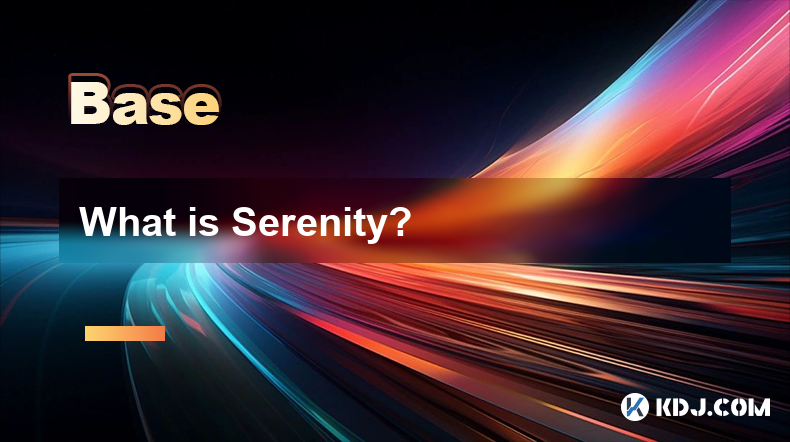
What is Serenity?
Apr 08,2025 at 02:00pm
Serenity, also known as Ethereum 2.0, represents a major upgrade to the Ethereum blockchain. This ambitious project aims to address the scalability, security, and sustainability issues faced by the current Ethereum network. Serenity is not a single update but a series of upgrades that will transform Ethereum into a more efficient and robust platform. Th...
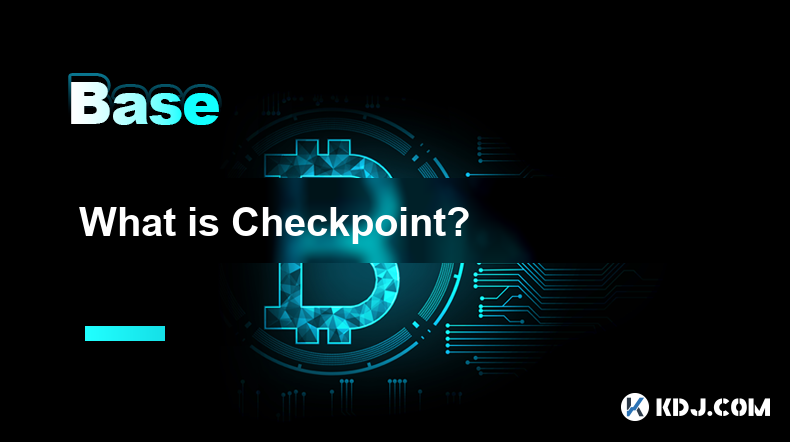
What is Checkpoint?
Apr 08,2025 at 05:08pm
A checkpoint in the context of blockchain and cryptocurrencies is a mechanism used to enhance the security and efficiency of a blockchain network. It serves as a snapshot of the blockchain at a specific point in time, which can be used to validate the integrity of the chain and prevent certain types of attacks. Checkpoints are particularly important in ...

What is Finality Gadget?
Apr 08,2025 at 04:14am
The Finality Gadget is a crucial component in the architecture of certain blockchain networks, particularly those that utilize a hybrid consensus mechanism. It plays a pivotal role in ensuring the finality of transactions, which means that once a transaction is confirmed, it cannot be altered or reversed. This article delves into the intricacies of the ...
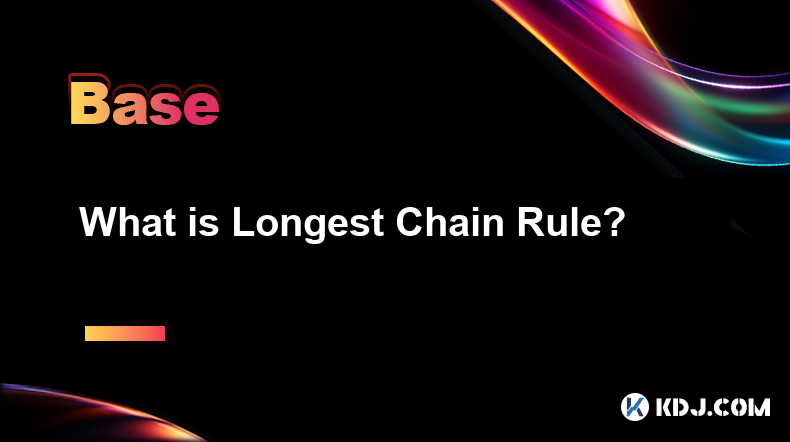
What is Longest Chain Rule?
Apr 08,2025 at 07:50am
The Longest Chain Rule is a fundamental concept in blockchain technology, particularly in the context of cryptocurrencies like Bitcoin. This rule is crucial for maintaining the integrity and security of the blockchain network. In essence, the Longest Chain Rule dictates that the valid blockchain is the one with the most cumulative proof-of-work, which i...
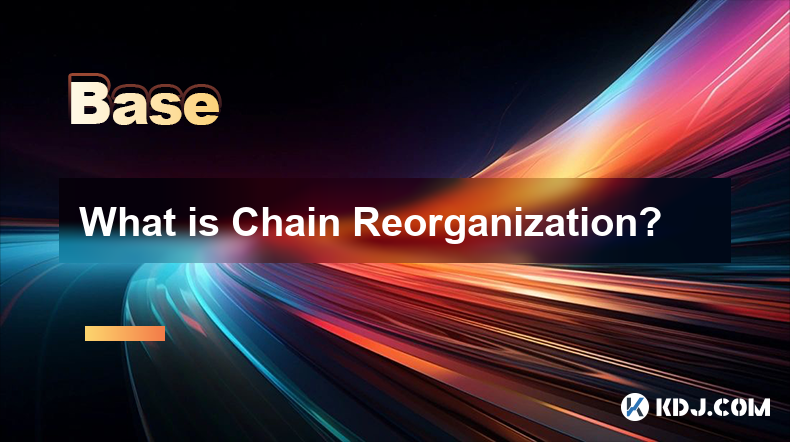
What is Chain Reorganization?
Apr 08,2025 at 03:08pm
What is Chain Reorganization? Chain reorganization, often referred to as a 'reorg,' is a fundamental concept in blockchain technology that can significantly impact the integrity and operation of a blockchain network. Chain reorganization occurs when a blockchain network replaces a previously accepted block or series of blocks with a new set of blocks, l...
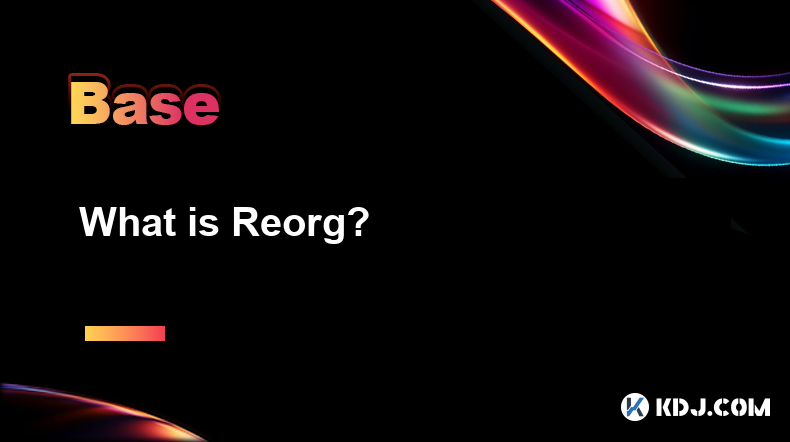
What is Reorg?
Apr 08,2025 at 11:08pm
What is Reorg?In the world of cryptocurrencies, particularly those that operate on blockchain technology, the term Reorg or Blockchain Reorganization is a critical concept that users and developers need to understand. A reorg refers to a situation where the blockchain undergoes a reorganization of its blocks, which can lead to changes in the accepted ve...

What is Serenity?
Apr 08,2025 at 02:00pm
Serenity, also known as Ethereum 2.0, represents a major upgrade to the Ethereum blockchain. This ambitious project aims to address the scalability, security, and sustainability issues faced by the current Ethereum network. Serenity is not a single update but a series of upgrades that will transform Ethereum into a more efficient and robust platform. Th...

What is Checkpoint?
Apr 08,2025 at 05:08pm
A checkpoint in the context of blockchain and cryptocurrencies is a mechanism used to enhance the security and efficiency of a blockchain network. It serves as a snapshot of the blockchain at a specific point in time, which can be used to validate the integrity of the chain and prevent certain types of attacks. Checkpoints are particularly important in ...

What is Finality Gadget?
Apr 08,2025 at 04:14am
The Finality Gadget is a crucial component in the architecture of certain blockchain networks, particularly those that utilize a hybrid consensus mechanism. It plays a pivotal role in ensuring the finality of transactions, which means that once a transaction is confirmed, it cannot be altered or reversed. This article delves into the intricacies of the ...

What is Longest Chain Rule?
Apr 08,2025 at 07:50am
The Longest Chain Rule is a fundamental concept in blockchain technology, particularly in the context of cryptocurrencies like Bitcoin. This rule is crucial for maintaining the integrity and security of the blockchain network. In essence, the Longest Chain Rule dictates that the valid blockchain is the one with the most cumulative proof-of-work, which i...

What is Chain Reorganization?
Apr 08,2025 at 03:08pm
What is Chain Reorganization? Chain reorganization, often referred to as a 'reorg,' is a fundamental concept in blockchain technology that can significantly impact the integrity and operation of a blockchain network. Chain reorganization occurs when a blockchain network replaces a previously accepted block or series of blocks with a new set of blocks, l...

What is Reorg?
Apr 08,2025 at 11:08pm
What is Reorg?In the world of cryptocurrencies, particularly those that operate on blockchain technology, the term Reorg or Blockchain Reorganization is a critical concept that users and developers need to understand. A reorg refers to a situation where the blockchain undergoes a reorganization of its blocks, which can lead to changes in the accepted ve...
See all articles






















































































